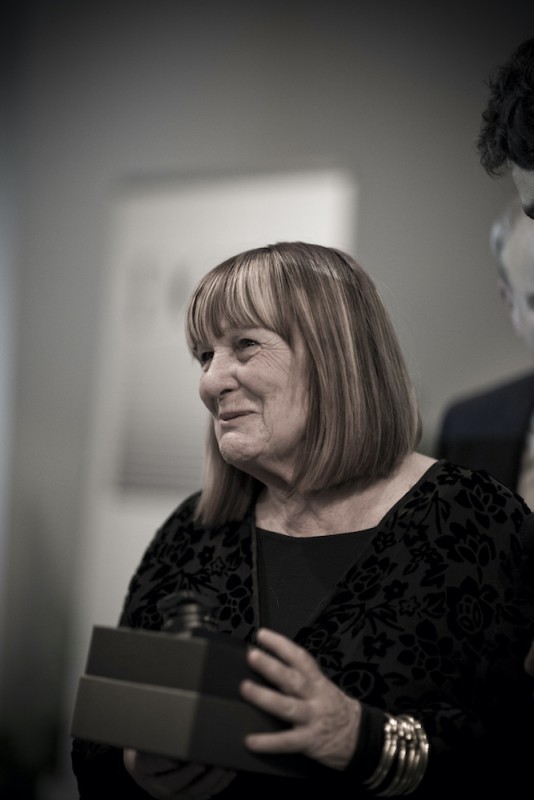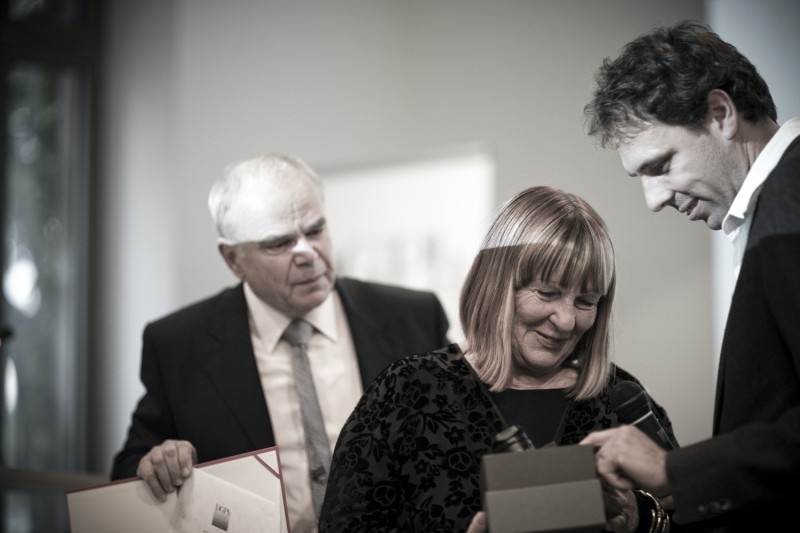Obituary: Letizia Battaglia
Obituary: Letizia Battaglia
April 20, 2022

Letizia Battaglia at the award ceremony of the Dr. Erich Salomon Prize of the DGPh, Ludwigshafen 2007, © Rüdiger Glatz, DGPh
The photographer was frequently the first person at the scene of the crime: she would listen to the police radio frequency while in her dark room, ensuring that she was closely informed about the murders and executions carried out by the Cosa Notra. She often took her pictures before the carabinieri even reached the site. Her photographs are direct, precise and relentless, revealing the merciless brutality and the suffering of families and those left behind. Since the 1970s, she has seen hundreds of victims, including judges, state prosecutors, policemen, officials, politicians, and trade unionists – but also, time and again, journalists who stood up to the Mafioso system. Battaglia tried to remain fearless and to persevere. An indomitable witness, she refused to accept this kind of everyday life.
Born in Palermo on March 5, 1935, she lived in Triest until she was eight years old. Later on, she would describe the return to the severe, patriarchal structures of southern Italy as a shock. She married when she was just 16, and became the mother of three daughters (including Shobha Battaglia, a successful photographer in her own right). In her mid thirties Battaglia decided to radically change her life: she “escaped” to Milan, where she became a journalist and got into photography. After getting divorced, she returned to Palermo and became a photographer for the newspaper, L'Ora. She began living with the photographer Franco Zecchin, with whom she also worked closely. Over the following years, she became a witness to and chronicler of the worst Mafia battles between the various clans of the Cosa Nostra.
In 1992 – following the murder of Judge Giovanni Falcone by the Corleonesi – she decided to stop going to crime scenes. Furthermore, L'Ora had been closed down. She worked for a number of years in Palermo's City Council, and was a deputy for the anti-mafia party, La Rete. She became Head of the Municipal Department for Quality of Life, and saw to the transformation of the city: illegal rubbish dumps disappeared, a beach promenade was created, the historic old town was rediscovered. Furthermore, she created her own book publishing company, co-founded a monthly feminist paper, and stood up for minorities and prisoners. In 2007, she established the International Center of Photography in Palermo. However, her name would always be linked to her commitment against the Mafia, and to this day she is considered one of Italy's most important photojournalists. Her work was celebrated and acknowledged, and represented in many exhibitions. In 2007, the German Photographic Society (DGPh) honoured her with the Dr. Erich Salomon Award (and a Leica).
The Mafia monster still exists and appears to remain ineradicable: despite her many years of commitment, Battaglia was forced to resign herself to this fact – yet the photographer's work served to ensure that the ugly story of their crimes could not be avoided; turning a blind eye was not an option. It is reckoned that she took around 600,000 pictures, “an archive of blood”, as she called it. Even so, her oeuvre has many other facets: she photographed everyday life in her home town: children playing, young boys, men gambling, women searching for independence, as well as processions and life on the street – and always with a precise eye for social conditions.
Battaglia passed away from cancer last week in Palermo, surrounded by her family. She was 87 years old. (Ulrich Rüter)

Letizia Battaglia at the award ceremony of the Dr. Erich Salomon Prize of the DGPh, Ludwigshafen 2007, © Rüdiger Glatz, DGPh

Prof. Dr. Ulrich Nickel (left), then Chairman of the German Photographic Society (DGPh) and Michael Agel, Leica Camera AG (right) at the presentation of a personally engraved Leica M7 to Letizia Battaglia, Ludwigshafen 2007, © Rüdiger Glatz, DGPh